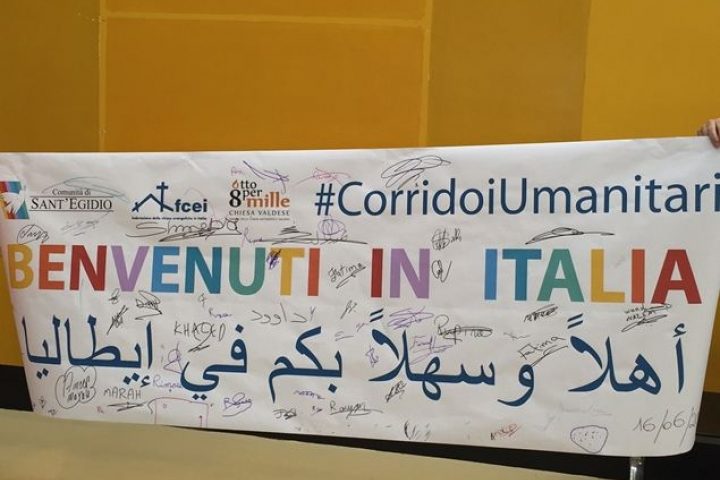- Mediterranean Hope - Federazione delle chiese evangeliche in Italia
- mh@fcei.it
Humanitarian corridors: a solution that works
Annnachiara Valle – Famiglia Cristiana
The appeal comes from terminal 5 of Rome International Airport where 81 Syrian Palestinians arrived after a journey that began in the refugee camps of Lebanon. It is an “appeal to the European governments to consider humanitarian corridors. This model must be adopted quickly in order to prevent more deaths at sea.” These are the words of Marco Impagliazzo, president of the Community of Sant’Egidio, as he welcomes to Italy 30 children (including two with severe disabilities) and 51 adults who will be guests of families, groups and associations throughout Italy. Many people have arrived with flowers and gifts to “bring home” the new arrivals because, as pointed out by Paolo Naso of the Federation of Protestant Churches (FCEI), “We are told to help you at home, but as long as there is no safety, this is now your home.” They will go to Tuscany, Lazio, Piedmont, Liguria, Lombardy, Campania, and Puglia. Five people will be welcomed by the Republic of San Marino, the first state, after Italy, to join the humanitarian corridors project. The project, created by a memorandum of understanding signed on 15 December by the Ministry of Foreign Affairs and International Cooperation – Directorate General for Italians abroad and Migration Policies, by the Ministry of the Interior – Department for Civil Liberties and Immigration, by the Community of Sant’Egidio, FCEI and the Tavola Valdese (Waldensian Board), has allowed 280 people to reach Italy safely. The initiative is entirely self-funded by promoters of the project who are also engaged in integration projects. “Currently, for example, all the children who have arrived go to school,” says Impagliazzo.
On 21 June, ensures Mario Giro, Deputy Foreign Minister, “Italy will present this model – which educates us on how to deal with this refugee crisis rationally, calmly, safely and respectful of everyone’s rights – to the general assembly of the United Nations. There is a lot of respect for what Italy is doing in the Mediterranean Sea and I hope our voices will be heard. Over the next two years, a thousand refugees from Lebanon, Morocco and Ethiopia are expected to arrive in our country. The refugees are chosen based on criteria of vulnerability: they are mostly families with children, single women, and the elderly, sick and disabled.
Abdel Ghani from the Syrian city of Homs, the “capital” of the revolution which has been almost completely destroyed, thanked organisers of the project on behalf of the 81 refugees who arrived on this third flight, “You have given us an opportunity, you have helped us to come here, you have welcomed us with flowers as a symbol of your humanity,” he said amid the general emotion. “God willing, if peace returns to our countries we will never forget what you have done for us.” In one corner, Salwa, who had just gotten off the plane, hugs her sister Muntaha, who has been waiting for her in Italy for more than a year. “My name means until the end,” she repeats, “and although I now feel Syrian and Italian, until the end I will not lose hope of returning in peace to my homeland.”





